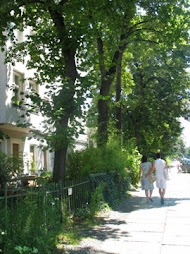Berlin is a place I love. At first I wasn't that too impressed with the place. I preferred Munich, a city with more beautiful architecture and parks. I still believe that, but after some time I discovered that Berlin has very beautiful places.
Look at the Landwehrkanal photo on the right. The picture shows me and my girlfriend walking on our way to get a all you can eat Sunday buffet. Walking along the Landwehrkanal once sees many interesting places, such as a place where a synagogue used to exist, before being destroyed by the Nazis.
That's the thing about Berlin, beauty alongside scars of the past. Berlin has places full of what Micha Ullman called the 'presence of absence', places where things used to be, that no longer are. People who used to live there, whose lives were taken away. How does one commemorate this absence?
I used to do tours in the Sachsenhausen concentration camp memorial site, where some group members would criticise the communist memorials there. Once, while doing a tour in the middle of a grassy area, I stopped talking and listened to the silence, as the wind rustled through the weeds. That, the nothingness, seemed a better form of commemoration. That is why Ullman used a empty library to show the place where around 20,000 books were burned by the Nazis, in Bebelplatz.
Nothingness, emptiness, silence. One find that in many places in Berlin. Even when new buildings have been made there or when it lays on a busy street, an absence is there, an absence that speaks of what used to be and what no longer is.
Sometime this absence has been commemorated through memorials, memorial sites, plaques, 'stumbling stones' and museums. People come to Berlin to search for these places where such presences commemorate such absences. Or people go to events where such absences are spoken of.
That is why I moved to Berlin, and is why I have started this site. Will you walk through Berlin with me, as I show you what I see, and speak of what was? I hope so. Write your comments underneath. :)
Friday, 25 January 2008
Subscribe to:
Post Comments (Atom)

4 comments:
I visited Berlin for the first time last November, with my wife. It's a remarkable city. History is everywhere. As you stand at the Brandenburg Gate and read its astonishing history, or lose yourself in the Memorial to the Murdered Jews of Europe, visit the Berliner Dom and marvel at such a Protestant cathedral (and remember its near destruction), or just look at the titles in a book shop. Painful history, lying just below every surface, no attempt to hide it or dress it up.
The wonderful walk-on public transport seemed a metaphor for the openess of the city.
We saw the Bonhoeffer House down a polite and leafy suburban road, and came and left via Tegel airport, near the site of the prison where he spent most of his last two years.
We stopped and took a photo at the corner where Kantstrasse crosses Leibnizstrasse!
History, but also, do you think, a record of human and social experiment - Weimar Republic, fascism, communism and partition, airlift, West Berlin, re-unification?
Cheers Hatless. :)
Just to warn you or anyone else, the public transport in Berlin is not free! It's just that you don't get checked every time. If you don't have a ticket you can get fined 40 Euros. It happened to me once. :( If you want to try, try though......
Ha! No, I didn't think it was free. We paid 21 Euros for three days travel, but having paid, you just walk on. No turnstiles. It felt a liberating means of travel.
I agree, Berlin is such as wonderful city full of culture and heritage. This is the reason why i want to study here and currently i am in search for Berlin universities.
Post a Comment